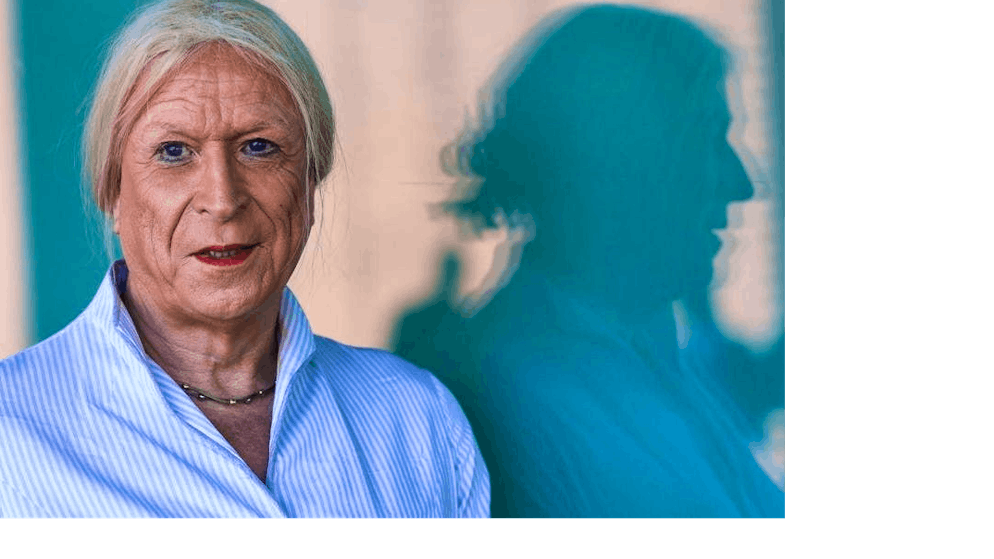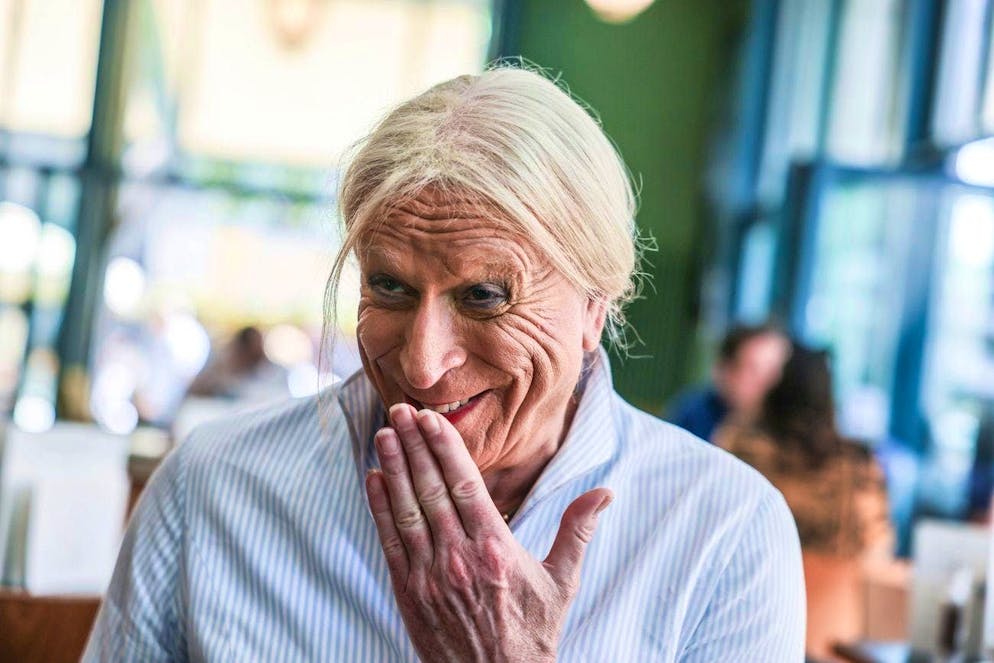Bötschi asks Georgine Kellermann "Alice Schwarzer took a wrong turn at some point"
Bruno Bötschi
15.6.2024

It took Georgine Kellermann 62 years to publicly admit her identity as a trans woman. A conversation about tolerance in our society, dealing with shitstorms - and what she regrets most.
No time? blue News summarizes for you
- Georgine Kellermann is one of the best-known trans activists in Germany.
- Her autobiography "Georgine - The Long Road to Myself" has just been published. In it, Kellermann continues her fight for more tolerance, visibility and normality in our society.
- "Today I am happier as Georgine than Georg. My good friend Astrid once said that I am a completely different person today," says Georgine Kellermann in an interview with blue News.
- You can find the first part of the interview with Georgine Kellermann here.
Ms. Kellermann, how did you feel when you held the first printed copy of your autobiography "Georgine - Der lange Weg zu mir selbst" in your hands a few days ago?
I was just talking to a friend yesterday about how it felt. They always say that writing and publishing a book is a bit like having a baby. My friend just said: "And you'll see, this love grows even more with time."
Are you afraid of bad reviews?
Of course there will be. I have to live with that. However, reviewing my life was so valuable that I would say it was worth it even if only one copy of my book was sold.
Were there times when you doubted whether it was a good idea to make your life story public?
There were no doubts.
About the author: Bruno Bötschi

blue News editor Bruno Bötschi regularly talks to well-known personalities from Switzerland and abroad for the question-and-answer game "Bötschi fragt". He asks them lots of questions - always direct, often funny and sometimes profound. It always remains open until the very last question as to where the fast-paced ping-pong will lead.
Have you never had a guilty conscience that your autobiography might put you in front of other trans people who have been out for much longer?
I never thought about that before. But it's a valid question.
In your book, you write: "For a long time, I kept to myself at home because I could be myself there. When I go to the cinema or theater today, so carefree, so light-hearted - almost as if I'm flying there - I sometimes ask myself: What have I missed? There's a bit of regret that I didn't do it sooner." What do you regret most when you look back on your life so far?
My biggest regret is that I have offended people who have supported me for years and whom I could trust one hundred percent.
What do you mean by that?
When my good friend Astrid said "I'll go with you in a skirt wherever you want to go, but go with me", I should have taken that seriously many years ago and jumped over my own shadow.
Psychotherapist Udo Rauchfleisch says that many people only decide to transition at a later stage in their lives. A burden would then fall away and they would be happier in old age than they were before they came out. Are you happier today as Georgine Kellermann than you were as Georg?
Yes, I am happier as Georgine than I was as Georg. My good friend Astrid once said that I am a completely different person today.
Are you also braver today as Georgine than you were as Georg?
I have to be less careful in some places today, whereas in other places I have to be more careful. If I'm standing on a platform, for example, I always make sure I have something behind me. I don't want anyone to get any ideas and try to push me. But not that you would think that this would bother me too much. At some point, this caution simply becomes second nature. But it doesn't weigh me down.
I would say that you have become braver and stand up for your opinion - if only because I read your tweets on X.
That's true, I counter more than I used to.

You've also had to deal with the odd shitstorm. What does that do to you?
You can get used to shitstorms. Even if I'm happy if I'm not the victim of them too often. Today, however, I know when it happens again: A shitstorm will pass.
You have also deleted tweets on X in the past. Why did you do that?
Specifically, the tweet "We must defend our democracy against its enemies, even by undemocratic means. Because it's worth it." I wanted to say that we must protect democracy. But this was completely misunderstood by certain people. That's why I deleted the tweet and explained myself afterwards. However, the hater community didn't want to see that again and instead opened a big can of worms. But deleting tweets is generally not a good idea.
Is social media a blessing or a curse for trans people?
I think it's a blessing. I don't know where I would be today without social media. What would I have done when I wanted to come out? Hire a stage and stand up there?
What is striking is that trans people's privacy is violated more quickly. They are almost forced to give information about their genitals and possible operations. How do you deal with verbal abuse in everyday life?
I don't know why the inhibition threshold towards trans people is often lower. For my part, I can say that I don't respond to verbal abuse. And anyway: trans people should clarify these questions with their doctors, psychologists and psychiatrists.
Basically, how do you see the current situation of trans people in Germany?
The situation is better today than it was a few years ago. For young people, trans has long been something completely normal. However, the fact that trans people continue to be bullied today certainly has something to do with the shift to the right in politics. The inhumane policies of parties such as the AfD make some people feel emboldened to continue belittling trans people.
According to statistics, acts of violence against queer people are on the rise.
I will not allow my life to be destroyed and knock on wood that I continue to do well with it.

In your autobiography, you describe a scene that took place in San Francisco: A woman admires your fingernails and asks who did them. You reply: "I did them myself." The woman says: "Wow, she did it herself." Are those moments when you think: How nice it would be if that were always the case?
I was touched by the fact that the woman really spoke to me straight away. Experiences like that do you good - but they also happen in Germany. As I was walking back to the hotel this morning, a woman turned around and said: "Excuse me, did I see you on TV yesterday? I think it's great that I can meet you here."
How happy were you when Nemo won this year's Eurovision Song Contest with the song "The Code"?
The victory showed that our society has come a lot further than some diehards would like.
Nemo identifies as non-binary. Why do you think there are still people who want to stick to the categories of "man" and "woman"?
Oh, I think we're on the right track and in a few years' time gender will no longer play as big a role as it does today.
Nadia Brönimann, one of Switzerland's best-known trans women, said in an interview with the Tages-Anzeiger newspaper a year ago :"I never have to, want to or can be like a biological woman. For a long time, the biological image of women was the role model that I wanted to copy one-to-one. But I will never achieve that. I have a different social background and a different body. It took me a while to understand that."
That is Ms. Brönnimann's experience. I can understand it, even if I can't agree with her completely and without further ado. I also know that I am different. At the same time, I'm aware that it's not just about biology.
Would you like to have dinner with Alice Schwarzer?
I would love to meet Alice Schwarzer in person.
Schwarzer is considered an icon of the women's movement. She has said several times in interviews: "There is a fashionable trend for young people to be trans. It's chic."
I believe that Alice Schwarzer used to do a lot to make things better for people like me. Among other things, she campaigned for liberalization.
What does that do to you when Schwarzer claims today: "Being trans is fashionable - and at the same time the biggest provocation. That's what makes it so attractive to young people."
I always say that Alice Schwarzer took a wrong turn at some point. That was some time ago. A discussion with her would probably not achieve much because she would hardly deviate from her opinion - not even if I could explain to her clearly what's wrong with me.
In September 2020, you wrote in the German weekly newspaper "Die Zeit" that when you were asked what "being a woman" meant to you, you found it difficult to put it into words. Did you find an answer to the question after writing your autobiography?
There are over 40 million women living in Germany. If they were all asked this question, there would be many different answers. And that's why I'd rather not get involved in this discussion. The danger is too great that pigeon chess would be played.
What would be played?
Arguing with stupid people is like playing chess with a pigeon. No matter how well someone plays chess, the pigeon will knock over all the pieces, poop on the board and strut around as if it had won.
The German Press Agency summarizes the message of your autobiography as follows: "The vast majority of people are much more tolerant than you think - and that's why everyone should dare to live as they really are."
Do you think that sounds a little too naive? Perhaps it has to do with a certain amount of self-protection, that I basically see life in a positive light and therefore want to end it on a nice note. But it's also a fact that since I came out, I've been attending Pride events regularly, standing up for myself much more often and standing up when something doesn't suit me. But I always try to remain friendly.
Will you continue to work as an author?
You know what, I originally wanted to write a completely different book. A biography about a Jew called Georg Kellermann, who lived in Berlin and was killed in Auschwitz. I see it as a personal obligation to tell his story. This is the project I will tackle next.
You can find the first part of the interview with Georgine Kellermann at this link.
"Georgine - Der lange Weg zu mir selbst", Georgine Kellermann, 288 pages, Ullstein Verlag, approx. 27 Fr.
